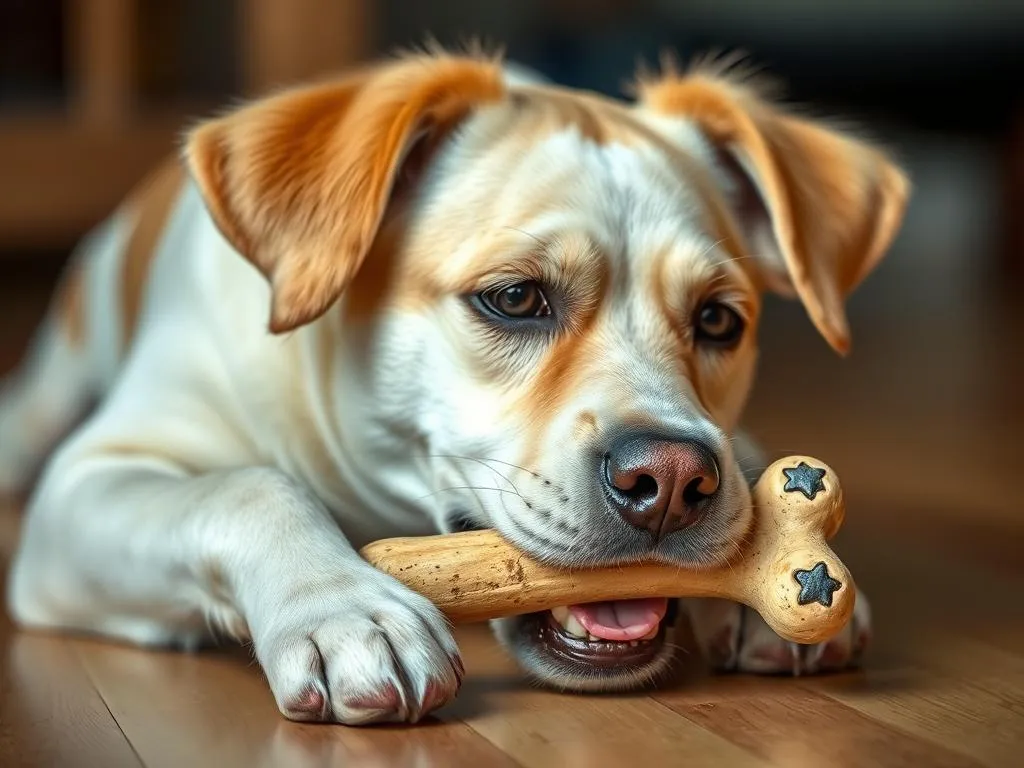
Understanding dog behavior is essential for any pet owner. One common behavior that often piques curiosity is why do dogs chew bones? This seemingly simple act is rooted in instinct and serves multiple purposes in a dog’s life. By exploring the reasons behind dogs’ affinity for chewing bones, we can uncover the instinctual, health-related, and behavioral aspects that influence this behavior.
The Instinctual Nature of Chewing
Evolutionary Background
To understand why do dogs chew bones, we must first look at their evolutionary background. Dogs are descendants of wolves, who relied heavily on chewing bones for survival. In the wild, chewing served several critical roles, including:
- Nutritional Value: Bones provided essential nutrients that were hard to find elsewhere, such as calcium and phosphorus.
- Hunting Tools: Chewing bones helped wolves to break down prey and extract marrow, a rich source of energy.
- Survival Mechanism: The act of chewing also helped maintain dental health, ensuring that wolves could effectively hunt and consume food.
Natural Instincts in Domestic Dogs
While domestic dogs have strayed far from their wild ancestors, many natural instincts persist. Chewing is one such behavior. Domestic dogs chew for various reasons, including:
- Natural Behavior: Chewing is an instinctual activity that fulfills a dog’s natural urge to gnaw and chew.
- Comparison to Wild Dogs: Unlike their wild counterparts, domestic dogs may not need to chew for survival, but they still engage in this behavior, which can be seen as a remnant of their evolutionary past.
Reasons Why Dogs Chew Bones
Dental Health
One of the primary reasons why do dogs chew bones is to maintain dental health. Chewing bones can help:
- Clean Teeth: The mechanical action of chewing scrapes away plaque and tartar, promoting oral hygiene.
- Prevent Dental Diseases: Regular chewing can reduce the risk of periodontal disease, which is common in dogs.
Nutritional Benefits
Bones are not just fun for dogs to chew on; they also offer nutritional benefits. Some key points include:
- Nutrients Found in Bones: Bones are rich in essential nutrients, including calcium and phosphorus, which are vital for bone health and overall well-being.
- Raw vs. Cooked Bones: While raw bones are typically safer and more nutritious, cooked bones can splinter and pose risks. It’s crucial to consider which type is best for your dog.
Mental Stimulation
Chewing bones also serves as a valuable source of mental stimulation for dogs. This behavior can:
- Provide Enrichment: Engaging with a bone encourages problem-solving and keeps dogs mentally active.
- Reduce Boredom and Anxiety: Chewing can help alleviate boredom and anxiety, especially in dogs that may struggle with separation anxiety.
Behavioral Aspects
Chewing isn’t just a physical activity; it can also have emotional implications. Consider the following:
- Stress-Relief Mechanism: Dogs often chew to relieve stress or frustration. The repetitive action can be calming for them.
- Connection to Separation Anxiety: Dogs that experience anxiety when left alone may resort to chewing as a coping mechanism.
Types of Bones for Dogs
Raw Bones vs. Cooked Bones
When considering why do dogs chew bones, it’s essential to understand the differences between raw and cooked bones:
- Safety and Digestibility: Raw bones are generally safer and more digestible than cooked bones, which can splinter and cause serious health issues.
- Recommended Raw Bones: Some safe options include chicken necks, beef ribs, or lamb shanks, which provide both enjoyment and nutrition.
Recreational Bones vs. Meaty Bones
Another distinction to make is between recreational bones and meaty bones:
- What Are Recreational Bones? These are typically larger bones meant for chewing and gnawing, providing entertainment and dental benefits.
- Benefits of Meaty Bones: Meaty bones contain flesh and connective tissue, offering nutritional value as well as enjoyment.
Bone Size and Dog Breed Considerations
Selecting the right bone size is crucial for safety and enjoyment:
- Importance of Size: A bone that is too small can pose a choking hazard for large breeds, while a bone that is too large may be difficult for small dogs to handle.
- Risks of Small Bones for Large Dogs: Large dogs may try to swallow small bones whole, leading to potential digestive issues.
Safety Precautions
Potential Risks of Chewing Bones
While chewing bones can be beneficial, there are risks involved:
- Splintering and Choking Hazards: Cooked bones can splinter, leading to choking or serious internal injuries.
- Digestive Issues: Some dogs may have difficulty digesting bones, leading to gastrointestinal blockages or other problems.
How to Supervise Chewing
Supervision is key when your dog is chewing on bones:
- Best Practices for Monitoring: Always watch your dog while they chew to catch any potential issues early.
- Signs to Watch For: If your dog shows signs of distress, such as coughing, gagging, or excessive drooling, it may indicate a problem.
Alternatives to Bones
If you’re concerned about the safety of bones, consider these alternatives:
- Safe Chew Toys and Treats: There are many durable chew toys made specifically for dogs that can provide similar benefits without the risks associated with bones.
- Natural Dental Chews: Many dental chews are designed to promote oral health while being safe for consumption.
Conclusion
Understanding why do dogs chew bones is vital for every pet owner. Chewing serves various purposes, from maintaining dental health to providing mental stimulation and stress relief. By selecting the right bones and taking safety precautions, you can ensure that your dog enjoys this natural behavior without unnecessary risks. Observing your dog’s individual preferences and behaviors will further enhance their chewing experience, making it a rewarding part of their daily routine.
FAQs
Can all dogs chew bones safely?
Not all dogs can chew bones safely. It depends on their size, age, dental health, and any existing medical conditions. Always consult your veterinarian before introducing bones to your dog’s diet.
What should I do if my dog swallows a bone?
If your dog swallows a bone, monitor them closely for any signs of distress. If they show symptoms like vomiting, lethargy, or difficulty defecating, contact your veterinarian immediately.
How often should I give my dog bones?
The frequency of giving bones varies by dog. Some dogs may benefit from chewing on bones a few times a week, while others might have them daily. Always balance bone chewing with a well-rounded diet.
Are there any breeds that should avoid bones?
Certain breeds, particularly those prone to dental issues or with specific health concerns, may need to avoid bones. Always consult your veterinarian to determine the best approach for your dog’s individual needs.









